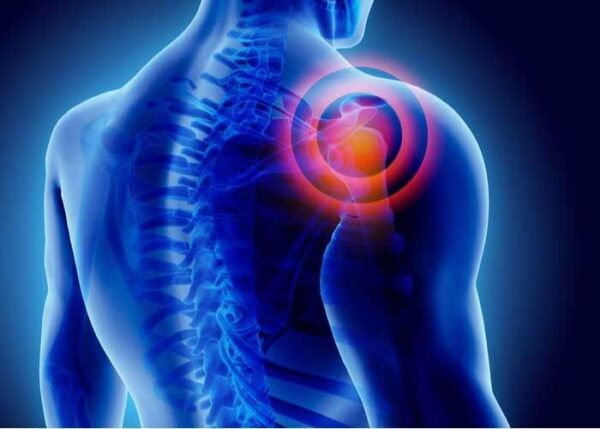Nerve Entrapment Specialist

Are you an athlete who participates in sports that invovle repetetive overhead movements like swimming, volleyball, baseball or tennis? If so, you may be at risk of developing a pinched nerve in your shoulder called suprascapular nerve entrapment. This condition can cause upper back and shoulder pain and even loss of shoulder function. Shoulder nerve entrapment specialist, Doctor Riley J. Williams provides diagnosis as well as surgical and nonsurgical treatment options for patients in Manhattan, Brooklyn, New York City and surrounding areas who have suprascapular nerve entrapment, or a compressed nerve in their shoulder. Contact Dr. Williams’ team today!
What is suprascapular nerve entrapment?
The suprascapular nerve arises from the middle of the cervical spine and innervates the supraspinatus and infraspinatus muscles of the rotator cuff. This nerve provides both motor and sensory information to these muscles in order to stabilize arm movements that occur at the shoulder joint. Suprascapular nerve entrapment, also known as suprascapular neuropathy, is a condition that results from impingement or damage to the suprascapular nerve. Conditions that are associated with suprascapular neuropathy include: rotator cuff tears, shoulder dislocation, fractured scapula fractures (shoulder blade), clavicle (collarbone) fractures, nerve stretch injuries, direct shoulder trauma, stab wounds and gunshot injuries. The patient with suprascapular nerve entrapment usually presents with shoulder pain and weakness. The signs of suprascapular neuropathy overlap with other more common shoulder conditions; this rare condition can often be overlooked or misdiagnosed. If suprascapular nerve entrapment is suspected, it is important to seek immediate medical attention from a medical professional or orthopedic shoulder specialist to prevent further damage to the suprascapular nerve. Dr. Riley J. Williams, orthopedic shoulder specialist serving patients in Manhattan, Brooklyn, New York City, NY and surrounding areas, has the knowledge and understanding, as well as substantial experience, in treating patients who have experienced suprascapular nerve entrapment.

What is suprascapular nerve compression?
Suprascapular nerve compression occurs when another anatomic structure presses directly on the nerve. Such structures include local ligaments (i.e. the suprascapular ligament) that can thicken and trap the suprascapular nerve. The nerve is also commonly entrapped at the spinoglenoid notch as it passes through to the infraspinatus muscle. Tumors, ganglion cysts, labral cysts and other structural irregularities of the scapula can cause suprascapular nerve compression.
Are there certain populations at greater risk for suprascapular nerve entrapment?
Yes. Since repetitive stretching of the suprascapular nerve can result in suprascapular neuropathy, athletes who consistently perform repetitive overhead movements (volleyball, baseball, weightlifting, swimming, tennis) are at high risk of developing suprascapular nerve entrapment. However, individuals with certain underlying health conditions that lead to the weakening of the scapular muscles, abnormal bone development, or scapular ligament irregularities are also at an increased risk for developing suprascapular nerve entrapment.
What are the symptoms of suprascapular nerve entrapment?
A common complaint of suprascapular neuropathy is a burning pain that radiates to the affected arm, neck, or back. Other symptoms of suprascapular nerve entrapment include:
- Shoulder pain, upper back discomfort
- Pain that generally worsens with shoulder movement
- Weakness of the affected shoulder or arm, especially external rotation of the arm
- Atrophy or deterioration of the affected shoulder muscles
- Partial or complete loss of shoulder function
How is suprascapular nerve entrapment diagnosed?
Because the symptoms of suprascapular neuropathy overlap with common shoulder conditions, it is important to seek prompt medical attention from an orthopedic shoulder specialist familiar with this condition. Dr. Williams will obtain a comprehensive medical history and perform a thorough physical examination. Specialized diagnostic imaging will be obtained to confirm damage to the suprascapular nerve. These imaging techniques may include radiographs, ultrasound, electromyography/nerve conduction study, and magnetic resonance imaging (MRI).
What is the treatment for suprascapular nerve entrapment?
Non-surgical treatment:
If a diagnosis of suprascapular nerve entrapment is confirmed, and the symptoms do not interfere with activities of daily living, conservative therapies may be sufficient in treating this condition. A combination of rest, ice, and non-steroidal anti-inflammatory medications (NSAIDs) are encouraged to control pain and to fdecrease inflammation. Applying heat prior to any shoulder stretching or strengthening activities is also recommended. Physical therapy aimed at increasing mobility, strength, and range of motion of the shoulder is recommended.
Surgical treatment:
In the event of severe nerve compromise, or if conservative therapy was unsuccessful, Dr. Williams may recommend an arthroscopic procedure to decompress the suprascapular nerve. Once the area of nerve compression is identified, Dr. Williams is able to expose the area and relieve the local nerve compression using minimally invasive instrumentation. This minimally invasive surgical approach is an effective technique for suprascapular nerve decompression. The arthroscopic approach shortens the recovery time for patients to return to their normal daily and athletic activities.
For more information on suprascapular nerve entrapment, or the excellent treatment options available, please contact the office of Dr. Riley J. Williams, an orthopedic shoulder specialist serving Manhattan, Brooklyn, New York City, NY and surrounding areas.
